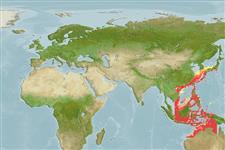Preferred temperature (Ref.
115969): 24 - 29, mean 28.1 (based on 352 cells).
Fylogenetische diversiteitsindex (Ref.
82804): PD
50 = 0.5000 [Uniqueness, from 0.5 = low to 2.0 = high].
Bayesian length-weight: a=0.01413 (0.01185 - 0.01684), b=2.96 (2.92 - 3.00), in cm Total Length, based on LWR estimates for this species (Ref.
93245).
Trofisch niveau (Ref.
69278): 4.0 ±0.57 se; based on food items.
Weerstandsvermogen (Ref.
120179): Gemiddeld, minimale populatieverdubbelingstijd 1,4-4,4 jaar (K=0.24-0.45; Fec=2,000).
Prior r = 0.91, 95% CL = 0.60 - 1.37, Based on 2 stock assessments.
Fishing Vulnerability (Ref.
59153): Low to moderate vulnerability (35 of 100).
Climate Vulnerability (Ref.
125649): Moderate to high vulnerability (48 of 100).
